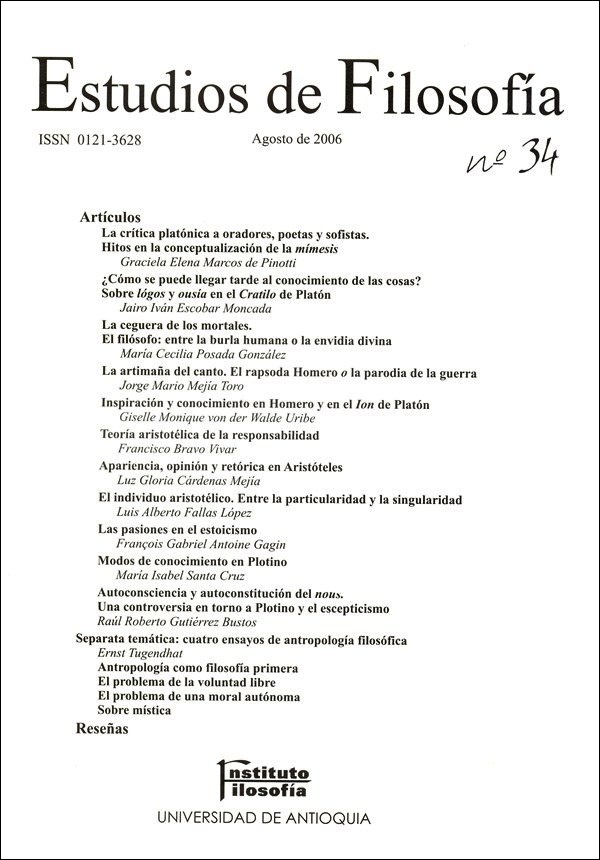The Blindness of Mortals. The Philosopher: between Human Jest and Divine Envy
DOI:
https://doi.org/10.17533/udea.ef.12776Keywords:
Blindness, philosopher, theory, vision, gods, contemplation, laughterAbstract
The first Philosophers were very conscious of the novelty that they introduced in the way they related to the World, which is, a change in perspective that distanced from the dose and the immediate, to approach everything contemplatively. From the predominance that vision had in the Greek tongue came terms and metaphors as the blindness of mortal people, which not only illustrate the contrast between the daily way of life and the philosophical one, but which dramatize it as the old anecdote on Thales. Why, both yesterday and today, is the Philosopher laughablefor the majority, while, he considers himself object of the envy o f the gods?
Downloads
References
Aristóteles. Metafísico. Madrid, Aguilar, 1973.
Hegel, G W.F. Lecciones sobre la historia de la filosofía, Vol. 1. México, F.C.E., 1977.
Heidegger, Martín. ¿Qué significa pensar? Buenos Aires, Nova, 1972.
Homero. Ilíada. México, Porrúa, 1977.
Kirk y Raven. Los filósofos presocráticos. Madrid, Gredos, 1974.
Laercio, Diógenes. Vidas de filósofos. Vol. D. Barclona, Iberia, 1962.
Nietzsche, Federico. Cinco prólogos para cinco libros no escritos. Madrid, Arena libros., 1999.
Píndaro. Himnos triunfales. Barcelona, Iberia, 1968.
Platón. Obras completas. Madrid. Aguilar, 1977.
Ronchi, Rocco. La verdad en el espejo. Madrid, Akal, 1996
Downloads
Published
How to Cite
Issue
Section
Categories
License
Copyright (c) 2006 María Cecilia Posada González

This work is licensed under a Creative Commons Attribution-NonCommercial-ShareAlike 4.0 International License.
Authors who publish with this journal agree to the following terms:
1. The Author retains copyright in the Work, where the term "Work" shall include all digital objects that may result in subsequent electronic publication or distribution.
2. Upon acceptance of the Work, the author shall grant to the Publisher the right of first publication of the Work.
3. The Author shall grant to the Publisher a nonexclusive perpetual right and license to publish, archive, and make accessible the Work in whole or in part in all forms of media now or hereafter known under a Creative Commons Attribution-NoCommercia-ShareAlike (CC BY-NC-SA 4.0), or its equivalent, which, for the avoidance of doubt, allows others to copy, distribute, and transmit the Work under the following conditions: (a) Attribution: Other users must attribute the Work in the manner specified by the author as indicated on the journal Web site;(b) Noncommercial: Other users (including Publisher) may not use this Work for commercial purposes;
4. The Author is able to enter into separate, additional contractual arrangements for the nonexclusive distribution of the journal's published version of the Work (e.g., post it to an institutional repository or publish it in a book), as long as there is provided in the document an acknowledgement of its initial publication in this journal;
5. Authors are permitted, and Estudios de Filosofía promotes, to post online the preprint manuscript of the Work in institutional repositories or on their Websites prior to and during the submission process, as it can lead to productive exchanges, as well as earlier and greater citation of published work (see The Effect of Open Access). Any such posting made before acceptance and publication of the Work is expected be updated upon publication to include a reference to the Estudios de Filosofía's assigned URL to the Article and its final published version in Estudios de Filosofía.















